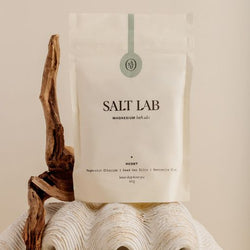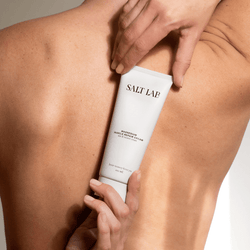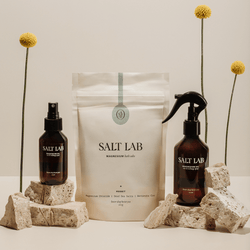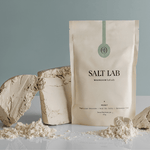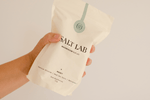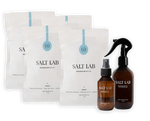In the pursuit of wellness, understanding the intricate workings of our bodies can be a game-changer. Among the many elements crucial to our well-being, one duo stands out: GABA and magnesium. Let’s delve into the fascinating connection between these two and unveil how they hold the key to stress relief and anxiety management.
GABA: Unravelling the Calming Neurotransmitter
GABA, short for Gamma-Aminobutyric Acid, is our body’s natural calming neurotransmitter. Think of it as your internal chill pill. Its primary role is to inhibit or reduce the activity of nerve cells in the brain and nervous system, leading to a state of relaxation. When GABA levels are optimal, we experience a sense of calmness, tranquillity, and mental clarity.
But what exactly happens when GABA is in short supply? Imagine a bustling city street suddenly devoid of traffic lights – chaos ensues. Similarly, when GABA levels dip, nerve cells become hyperactive, leading to a cacophony of anxious thoughts and feelings. Research suggests that low GABA levels may contribute to various mental health concerns, including anxiety disorders, insomnia, and even epilepsy. Therefore, maintaining a delicate balance of GABA is paramount for promoting overall well-being and emotional resilience.
Moreover, the intricate interplay between GABA and other neurotransmitters further highlights its significance in regulating mood and cognition. By inhibiting the excessive firing of excitatory neurotransmitters like glutamate, GABA acts as a natural buffer against stress, ensuring a harmonious equilibrium within the brain.
Magnesium: The Mineral Fuelling Relaxation
Magnesium is a mineral often referred to as nature’s relaxant. Magnesium is involved in over 300 biochemical reactions in the body, including the synthesis of GABA. Without sufficient magnesium, our GABA receptors can become less responsive, leading to increased feelings of stress and anxiety.
Beyond its role in GABA synthesis, magnesium exerts its calming influence through various mechanisms, each contributing to its reputation as the ultimate relaxation elixir. For instance, magnesium acts as a natural antagonist to calcium, another mineral involved in nerve cell signalling. By counteracting the excitatory effects of calcium, magnesium helps maintain neuronal balance, preventing overstimulation and promoting a state of tranquillity.
Furthermore, magnesium boasts vasodilatory properties, meaning it can widen blood vessels and improve blood flow throughout the body. This enhanced circulation not only ensures adequate oxygen and nutrient delivery to tissues but also facilitates the removal of metabolic waste products, promoting overall relaxation and well-being. Additionally, magnesium plays a crucial role in regulating muscle function and tension, making it indispensable for soothing muscular aches and promoting restful sleep.
The Magnesium-GABA Connection
Magnesium facilitates the release and function of GABA in the brain. It acts as a cofactor for enzymes involved in GABA synthesis, ensuring that our calming neurotransmitter is produced in adequate amounts. Moreover, magnesium binds to GABA receptors, enhancing their sensitivity and promoting a deeper state of relaxation.
Research has suggested that magnesium deficiency may compromise GABAergic neurotransmission, leading to heightened anxiety and stress susceptibility (Boyle, 2017). By replenishing magnesium levels through dietary sources or supplementation, individuals can optimise GABA function, fortifying their resilience against the rigours of daily life. The magnesium-GABA connection represents a harmonious alliance between two essential players in the pursuit of relaxation and emotional well-being.
Topical Magnesium: A Direct Pathway to Stress Relief
While oral magnesium supplements are widely known, topical magnesium offers a unique advantage. By bypassing the digestive system and absorbing directly through the skin, topical magnesium delivers a potent dose of this vital mineral straight to your cells, where it can swiftly get to work.
Why Topical Magnesium is Your Stress-Busting Ally
- Rapid Absorption: Unlike oral supplements, which may encounter absorption challenges, topical magnesium is absorbed efficiently through the skin, ensuring quick delivery to target tissues.
- Localised Relief: Target specific areas of tension or discomfort by applying topical magnesium directly to the skin, allowing for localised relaxation and relief.
- Gentle on the Digestive System: For those with sensitive stomachs or digestive issues, topical magnesium offers a gentle alternative to oral supplements, bypassing potential gastrointestinal disturbances.
- Versatile Application: Whether in the form of magnesium oil sprays, creams, or bath salts, topical magnesium offers versatile application methods to suit your preferences and lifestyle.
We suggest you simply apply our magnesium oil spray to areas of tension or discomfort (behind the neck, shoulders or stomach), allowing the mineral to penetrate the skin and promote a sense of calmness.
Incorporating topical magnesium into your wellness routine can be a game-changer in your quest for stress relief and anxiety management. By nourishing your body with this essential mineral, you support the synthesis of GABA, promote relaxation, and restore balance to your mind and body.
References:
Boyle, N.B., Lawton, C. & Dye, L. The Effects of Magnesium Supplementation on Subjective Anxiety and Stress—A Systematic Review. Nutrients 9, 429 (2017). https://doi.org/10.3390/nu9050429

